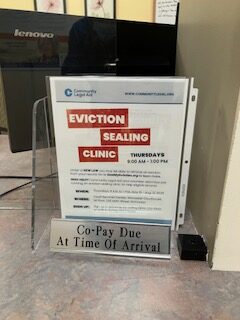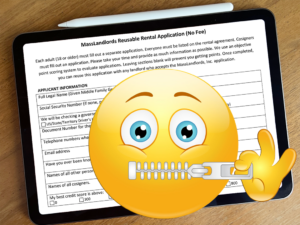Eviction Sealing Effective May 2025 – What Landlords Need to Know
By Kimberly Rau, MassLandlords, Inc.
Gov. Maura Healey signed 193 H.4977, also known as the Housing Bond Bill, into law on Aug. 1, 2024. The bill included eviction sealing, effective in May 2025. Here’s what you need to know.

Eviction sealing is in effect May 2025. Nearly all types of evictions will be eligible for sealing. (Image: Derivative 123rf; public domain)
Eviction sealing appeared in the House’s version of the Housing Bond Bill as H.4356, and was passed into law with very few changes made during conference committee. It appears as Section 52 of Chapter 150 of the Acts of 2024 and has its permanent location in Chapter 239.
As we did when H.4356 was introduced, we have prepared a line-by-line explainer of this law. The eviction sealing law stands to harm housing providers and good renters, and will place excessive burden on the courts. This article provides an overview of the law’s talking points.
In almost all cases, renters seeking to have their eviction sealed must notify the landlord, who has seven days to object to the process, at which point a hearing would be held. How the landlord must be notified is unclear.
![A cartoon image of a desktop computer monitor with an oversized image of a credit score meter, with colored sections indicating poor, fair and good credit. This hypothetical person has “good” credit.]](https://masslandlords.net/app/uploads/Eviction-Sealing-is-Law-Image-2-licensed-123rf.jpg)
Think a credit report will show owed judgments? Probably not anymore, as credit reporting agencies will have to monitor for sealed evictions constantly. (Image: Licensed 123rf)
No Cause Stated Evictions Sealed Immediately
No-cause-stated evictions, also called no-fault evictions by renter advocates, are typically conducted when the landlord needs to deliver the property vacant for a sale, needs to use the unit themselves, or if the landlord is not able to provide enough evidence to make a for-cause eviction stick.
Under eviction sealing, a tenant can request this record be sealed as soon as the eviction process (including any appeals) is concluded.
This sounds fine until you realize that there are cases in which a no-fault eviction is the only way to get problematic tenants out, particularly if other tenants do not testify. We use Gwendolyn Property Management v. Goodwin as a prime example. The landlord had witnesses to the fact that the tenants were smoking in and around a non-smoking unit, but the judge threw it out as hearsay. A second eviction not for cause was the only way to remove the tenants. Is this a tenant you’d want renting from you?
Nonpayment Eviction Sealed in 4 Years
If a renter is evicted for nonpayment, they too may request that record be sealed. They just have to wait for four years from the conclusion of the case and appeal (if any). As long as they have not been filed against for nonpayment in that time, and they state that the reason for nonpayment was due to economic hardship, their record may be sealed.
The tenant must prove that hardship to the courts, though the law is murky about what constitutes “hardship.” Electric rates have risen sharply this year; will a higher utility bill count if the tenant says they paid Eversource and shorted the landlord to do so?
The landlord may object, and if they do, a hearing will be held. In other words, the court is going to have to listen to the eviction saga all over again before sealing the record (or not).
For-cause Evictions Sealed After 7 Years
A renter who is evicted for cause may petition to have their eviction record sealed as long as they avoid another no-cause-stated eviction case for seven years from the date of their case’s conclusion, and any appeals if applicable.
However, the law does not specifically state that other types of evictions count against the renter’s timeline. For example, if Ronald Renter has a for-cause eviction in 2025, and gets a nonpayment eviction filed against him in 2027, this does not interrupt the seven-year clock for sealing his for-cause eviction. And in fact, none of the timelines for any type of eviction specify that other types of eviction will interrupt the timeline toward getting the first case sealed.
If a renter is evicted for violating the “common nuisance law” (Chapter 139), they too may petition to have the eviction sealed after seven years. The courts will need to determine if they have had any violations in that timeframe. The common nuisance law includes charges such as prostitution, lewdness, gambling, alcohol served to minors, bootlegging, threat of violence, drugs, firearms and other illegal weapons, and explosives.
Cases Where Renter Prevails Immediately Sealed
In any eviction case where the renter wins, they may petition the court to have that record sealed as soon as the case/appeal is concluded.
To do so, the renter must return to the court where the case was held, but in this instance, the landlord does not need to be notified, presumably because the renter won the case.
Landlords: Tell Court When Judgment Has Been Satisfied…Or Else
A judgment for nonpayment is good for 20 years in Massachusetts. If a tenant pays off that money owed, it should be recorded as a satisfaction of judgment with the courts. Not every satisfied judgment was recorded, though; this was a problem eviction sealing advocates were trying to solve.
The eviction sealing law now requires landlords to inform the courts when a judgment has been satisfied, and requires them to do the same for agreements. Again, the wording is unclear. Sometimes agreements are satisfied on a continuing basis, such as a ruling that all rent must be paid by the 5th of the month. Does the landlord need to notify the court monthly?
Regardless, if the landlord does not notify the court that the judgment or agreement has been satisfied, the renter has the option to petition the court to declare the judgment or agreement satisfied.
The landlord must be notified if the renter petitions the court. If the landlord objects, then the court must hold a hearing and determine whether the judgment was actually satisfied.
But if there is no objection from the landlord, the courts must mark the judgment as satisfied. If the renter is prepared to lie in court, the landlord is left to prove a negative (“they did not pay me the owed money”). Proving a negative is very difficult. If the renter is prepared to commit perjury, this is a workaround to the 20-year judgment timeline.
Evictions with satisfied judgments can be immediately sealed if the renter petitions.
Who Can See Sealed Eviction Records?
The law does allow for some instances where sealed records may be accessed. Law enforcement can access them for the purposes of criminal investigation or criminal trials where the sealed eviction is relevant and/or part of evidence.
Journalists, researchers and law enforcement must petition for access to sealed court records. The court has this discretion as long as the request is for “public safety, scholarly, educational, journalistic or governmental purposes only.”
This means it’s up to the court to determine whether the requesting party is asking for the right reasons. Records may never be used for “commercial purposes.” Will the courts consider a media outlet commercial, if the outlet sells ad time or copies of its publication? Another gray area.
If you are a party to the case (landlord or tenant), you may petition to access your own record. Either you or your legal representation can request this.
Credit reporting agencies may not report on information contained in sealed records. Since evictions may be sealed at many different points following the conclusion of a case, such agencies would need to continually scour court reports to see what evictions have been sealed and remove them. This likely means credit reporting agencies will stop reporting for-cause evictions after 7 years, nonpayment after 4 years, or no-cause-stated evictions at all, regardless of whether they have been sealed.
Credit reporting agencies may still report publicly available information.
The Fallout of Eviction Sealing
At time of writing, eviction sealing does not take effect until May 2025, but we can predict some of the negative outcomes.
First, as landlords lose money on unpaid rent and property damage that they could have otherwise foreseen, rents will increase. We see this when rental units are renovated or retrofitted, and the same will apply here.
The 96% of renters who previously relied on a clean eviction history to bolster their application may find it harder to get approved for rentals. Conversely, the 4% of bad renters, such as professional tenants like the Callahans, will be protected as long as they manage to go four years without an eviction for nonpayment. All they need to do to make that happen is move over the state line and cause havoc elsewhere for a little while.
The new requirements on the court, including researching criminal histories and essentially re-conducting eviction hearings, will bog down an already over-burdened system. This is the last thing anyone needs.
May 2025 Update
Legal services started advertising eviction sealing in Spring 2025.

This photo was taken by a visitor at one of the UMass medical healthcare provider check-in desks in early May 2025.
Petitions to seal started to be filed on or around May 5.
We will continue to update this article as eviction sealing progresses.






